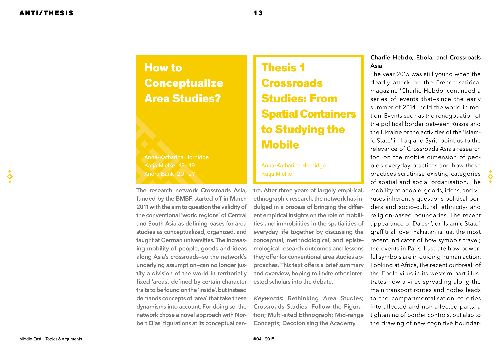Crossroads Studies: From Spatial Containers to Studying the Mobile
The research network Crossroads Asia, funded by the BMBF, started off in March 2011 with the aim to question the validity of the conventional 'world regions' of Central and South Asia as defining bases for area studies as conceptualized, organized, and taught at German universities. The in...
保存先:
| 出版年: | Middle East - Topics & Arguments |
|---|---|
| 主要な著者: | , |
| フォーマット: | Artikel (Zeitschrift) |
| 言語: | 英語 |
| 出版事項: |
Philipps-Universität Marburg
2015
|
| 主題: | |
| オンライン・アクセス: | オンライン・アクセス |
| タグ: |
タグ追加
タグなし, このレコードへの初めてのタグを付けませんか!
|
| 要約: | The research network Crossroads Asia, funded by the BMBF, started off in March 2011 with the aim to question the validity of the conventional 'world regions' of Central and South Asia as defining bases for area studies as conceptualized, organized, and taught at German universities. The increasing mobility of people, goods and ideas along Asia's crossroads—so the network's underlying assumption—can no longer justify a division of the world in territorially fixed 'areas', defined by certain character traits to be found on the 'inside', but instead demands concepts of 'area' that take these dynamisms into account. For doing so, the network chose a novel approach with Norbert Elias' figurations at its conceptual centre. After three years of largely empirical, ethnographic research, the network has indulged in a process of bringing the different empirical insights on the role of mobilities and immobilities in the spatialities of everyday life together by discussing the conceptual, methodological, and epistemological research outcomes and lessons they offer for conventional area studies approaches. This text offers a brief summary and overview, hoping to invite other interested scholars into the debate. |
|---|---|
| DOI: | 10.17192/meta.2015.4.3577 |
 Publikationsserver
Publikationsserver